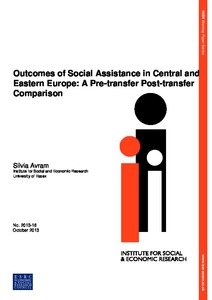Outcomes of social assistance in Central and Eastern Europe: a pre-transfer post-transfer comparison
"The poverty reduction potential of national social assistance programs in eight Central and Eastern European countries is examined using data from the EU-SILC. Results indicate that social assistance programs are a marginal component of the social protection system throughout the region. They...
| Main Author: | |
|---|---|
| Institution: | ETUI-European Trade Union Institute |
| Format: | TEXT |
| Language: | English |
| Published: |
Colchester
2013
ISER |
| Subjects: | |
| Online Access: | https://www.labourline.org/KENTIKA-19122751124919409339-outcomes-of-social-assistance-.htm |
| Summary: | "The poverty reduction potential of national social assistance programs in eight Central and Eastern European countries is examined using data from the EU-SILC. Results indicate that social assistance programs are a marginal component of the social protection system throughout the region. They serve small populations, spend relatively little compared to needs and the benefits they award are largely a top-up for their clients. However, the more extensive and liberal programs achieve higher effectiveness in reducing poverty. Unlike Western Europe, no trade-off between extensiveness and benefit generosity or between generosity and efficiency could be found. Decentralization and discretion are associated with inefficiency and arbitrariness in entitlement decisions rather than improved targeting." |
|---|---|
| Physical Description: | 61 p. Digital |

